Your cat’s skin health is vital for their overall well-being. Just like humans, cats can experience various skin problems that can cause discomfort and affect their quality of life. In this comprehensive guide, we will explore the importance of cat skin care, the role of nutrition in maintaining healthy feline skin, grooming practices, common skin problems in cats, the significance of regular bathing, and tips for supplements and flea prevention. By following these guidelines, you can ensure your feline companion’s skin stays nourished, vibrant, and free from any potential issues.
Key Takeaways:
- Feeding your cat a balanced and complete diet is crucial for their skin health.
- Consult with a veterinarian to determine the optimal diet for your cat’s specific needs.
- Regular grooming helps maintain a cat’s coat and skin in good condition.
- Be aware of common skin problems in cats and seek veterinary advice for proper treatment and management.
- Bathing should be done when necessary using cat-specific products.
The Importance of Nutrition in Cat Skin Care
Nutrition plays a crucial role in maintaining the health and appearance of your cat’s skin and coat. Just like humans, cats need a well-balanced diet to support their overall well-being, including their skin health.
A proper diet for cats should include high-quality proteins, carbohydrates, fats, minerals, and vitamins. These nutrients provide the necessary building blocks for healthy skin and hair. Protein is particularly essential for promoting hair growth and maintaining the integrity of the skin.
Insufficient or poor-quality nutrition can lead to various skin issues in cats. Cats with a lack of essential nutrients may experience dry and flaky skin, dull and brittle hair, excessive shedding, and even skin allergies. It is important to provide your furry friend with a diet that meets their specific nutritional needs to support their skin health.
If you’re unsure about the optimal diet for your cat, it is best to consult with a veterinarian. They can recommend a suitable dietary plan based on your cat’s specific life stage and health status. A veterinarian’s guidance is invaluable in ensuring that your cat receives the right nutrients for healthy skin and overall well-being.
Here are some key nutrients that play a vital role in cat skin health:
Omega-3 and Omega-6 Fatty Acids
- Omega-3 fatty acids, such as alpha-linolenic acid and eicosapentaenoic acid, help maintain the skin’s water permeability barrier and reduce inflammation.
- Omega-6 fatty acids, such as linoleic acid and arachidonic acid, help maintain the integrity of the skin.
Vitamins and Minerals
- Vitamin A contributes to skin cell growth and repair.
- Vitamin E acts as an antioxidant, protecting the skin from free radicals.
- Zinc promotes skin healing and supports the skin’s immune function.
Ensuring that your cat’s diet contains these essential nutrients will contribute to healthier skin and coat. Remember, good nutrition is the foundation for overall feline health, and healthy skin starts from within. Provide your cat with a well-rounded diet, and consult with a veterinarian for guidance on their specific dietary needs.
Grooming and its Impact on Cat Skin
Regular grooming is essential for maintaining the health and well-being of your cat’s skin and coat. Not only does grooming help keep your furry friend looking their best, but it also plays a vital role in preventing and addressing various skin issues that cats may encounter.
One of the primary benefits of grooming is that it helps remove loose hairs, dead skin cells, and dirt from your cat’s coat. This process not only keeps the fur looking clean and tidy but also prevents matting and tangling, which can be uncomfortable for your cat and potentially lead to skin problems.
When you groom your cat, the act of brushing helps distribute the natural oils produced by their skin. These oils are essential for moisturizing the skin and keeping the fur shiny and healthy. Regular brushing can prevent the coat from becoming dull and dry, promoting optimal skin health.
Different cat breeds have varying grooming needs. Some cats, such as long-haired breeds like Persians or Maine Coons, require daily brushing to prevent matting and keep their fur in good condition. Short-haired cats may only need brushing once a week. By understanding and meeting your cat’s specific grooming requirements, you can contribute to their overall skin health.
Grooming also provides an opportunity to inspect your cat’s coat and skin for any abnormalities or signs of illness. By carefully examining your cat’s skin during the grooming process, you can identify issues such as dryness, redness, swelling, or the presence of pests like fleas or ticks. Early detection of these problems allows for prompt intervention and treatment, promoting optimal cat skin health.
In conclusion, regular grooming is a fundamental aspect of cat care that directly impacts the health and appearance of your cat’s skin. Through brushing and inspection, you can maintain a clean and well-groomed coat, prevent matting, distribute natural skin oils, and identify any potential skin issues early on. By prioritizing grooming as part of your cat’s routine, you are ensuring their optimal skin health and overall well-being.
Common Skin Problems in Cats
Cats, just like humans, can experience various skin problems. These conditions can range from allergies to seborrhea and dermatitis, leading to discomfort and changes in the production of skin oils. One of the most common indicators of skin trouble in cats is excessive itching and shedding.
Allergic skin diseases can stem from a range of factors, including environmental allergens, certain foods, or even flea bites. It is crucial to identify the underlying cause of allergies to effectively manage the symptoms and prevent further skin-related issues.
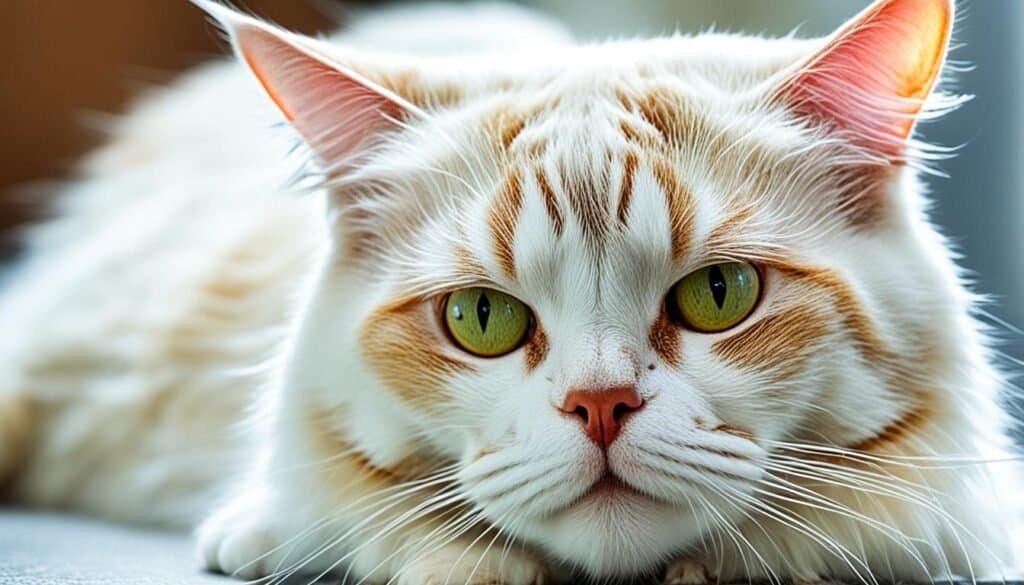
Seborrheic dermatitis, a condition characterized by oily or flaky skin, can be inherited or caused by an underlying medical condition. It can result in discomfort for your feline friend, leading to excessive scratching and self-grooming.
To tackle these common skin problems, it is essential to consult a veterinarian for a proper diagnosis. Depending on the specific condition, treatment options may include dietary changes, prescription medication, or topical treatments. Each cat’s case is unique, and a tailored approach is required to address their individual needs.
Cat skin treatment varies depending on the specific issue at hand. Implementing the prescribed treatment regimen is essential to alleviate discomfort and improve the overall health and appearance of your cat’s coat.
Remember, your cat’s skin health and well-being are vital to their overall quality of life. By addressing any skin problems promptly and providing the necessary treatment, you can ensure your furry friend stays happy, comfortable, and looking their best.
The Role of Regular Bathing in Cat Skin Care
Most cats are fastidious groomers and do not require frequent bathing. However, there are certain circumstances where bathing may be necessary, such as when a cat’s coat becomes excessively dirty or greasy. Bathing is an essential aspect of cat skin care, promoting cleanliness and maintaining optimal skin health.
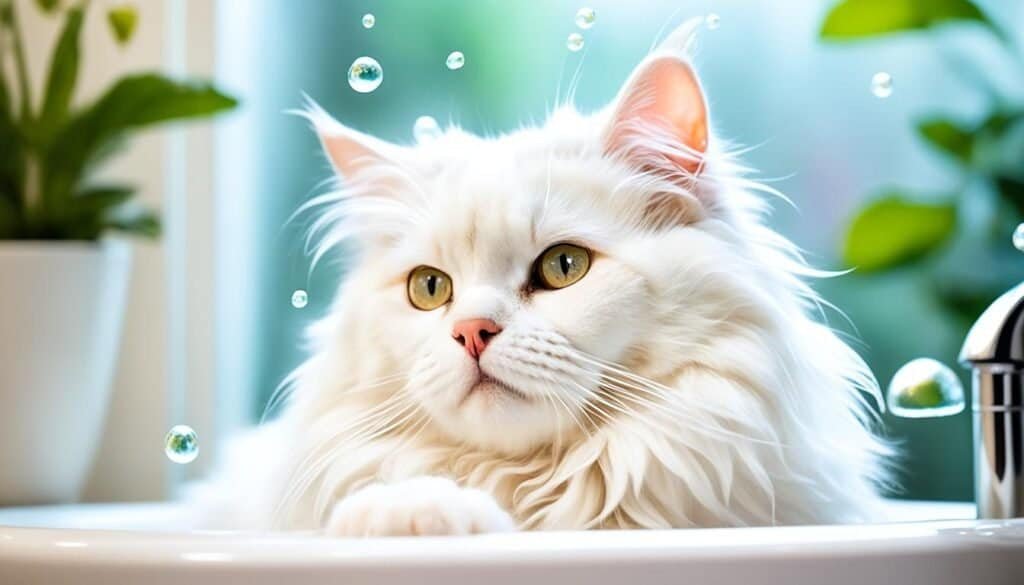
When bathing a cat, it is crucial to use shampoos and soaps specifically formulated for cats. General human or dog products can be harmful to felines due to their unique skin composition. Cat-friendly products help maintain the natural pH balance of their skin, preventing dryness, irritations, or allergic reactions. Consult with a veterinarian to ensure you choose the most suitable bathing products for your cat’s specific needs.
Regular bath frequency varies depending on the individual cat and their lifestyle. Some cats may need a bath only once or twice a year, while others might require more frequent bathing. Factors such as coat length, outdoor exposure, and medical conditions can influence the bathing frequency.
Steps for bathing your cat:
- Prepare the bathing area in a warm and quiet room where your cat feels safe and secure.
- Gently brush your cat’s coat to remove any tangles or mats before bathing.
- Use lukewarm water, never hot or cold, to wet your cat’s fur. Ensure the water level is shallow enough to prevent stress or discomfort.
- Gently apply the cat-specific shampoo, massaging it into the coat while avoiding the head and ears.
- Rinse your cat thoroughly, taking care to remove all traces of shampoo from the fur.
- Use a soft towel to gently dry your cat, patting the fur rather than rubbing.
- Supervise your cat until they are completely dry, as cats can easily catch a chill if not dried properly.
It is important to note that some cats with specific skin conditions may require regular therapeutic baths as part of their treatment regimen. These therapeutic baths often involve the use of medicated shampoos or topical treatments prescribed by a veterinarian. Follow the recommended frequency and duration of therapeutic baths to promote healing and manage skin conditions effectively.
By incorporating regular bathing into your cat’s skin care routine when necessary, you can help maintain cleanliness, reduce the risk of skin issues, and promote overall skin health.
Supplements and Flea Prevention for Cat Skin Health
In addition to a balanced diet and regular grooming, certain supplements and flea prevention measures can contribute to maintaining optimal cat skin health. These measures can help alleviate skin irritation, itching, and prevent common skin problems. It is important to consult with a veterinarian before introducing any supplements to your cat’s diet, as they can provide guidance tailored to your cat’s specific needs.
Supplements for Healthy Skin:
- Fish oil supplements: Fish oil contains anti-inflammatory properties that can help reduce skin irritation and itching.
- Sunflower or safflower oil: These oils provide essential nutrients that promote healthy skin in cats.
Flea Prevention:
Regular flea prevention is essential for cat skin care as fleas can cause itching, irritation, and skin problems. Use recommended flea prevention products and keep track of treatment dates to ensure the ongoing protection of your cat’s skin. Your veterinarian can provide guidance on the most suitable flea prevention products for your cat’s specific needs.
By implementing these supplements and flea prevention measures, you can help maintain your cat’s skin health and prevent common skin problems.
Conclusion
Taking care of your cat’s skin is essential for their overall health and well-being. By prioritizing cat skin care, you can ensure that your feline companion has a glowing coat and healthy skin throughout their life.
Providing a balanced and nutritious diet is crucial for maintaining good skin health in cats. Make sure to include omega-6 and omega-3 fatty acids in their diet, which help maintain the integrity of the skin and reduce inflammation. Consult with a veterinarian to ensure that your cat’s diet meets their nutritional needs.
Regular grooming plays a vital role in keeping your cat’s skin in good condition. Brushing removes loose hairs, dead skin cells, and dirt, while helping to distribute natural skin oils. Grooming also allows you to inspect your cat’s coat and skin for any abnormalities or signs of illness.
In some cases, supplements can be beneficial for improving a cat’s coat and skin health. Fish oil supplements and oils like sunflower or safflower oil can provide essential nutrients and alleviate skin irritation. Always consult with a veterinarian before introducing any supplements to your cat’s diet.
Additionally, bathing your cat when necessary using cat-specific products and implementing regular flea prevention measures are important for maintaining optimal cat skin health. These practices help to prevent skin problems caused by itching, scratching, and flea infestations.
By following these cat skin care practices, you can ensure that your furry friend’s skin remains healthy and vibrant, promoting their overall well-being. Remember to consult with a veterinarian for personalized advice and recommendations specific to your cat’s individual needs.
FAQ
Why is nutrition important for cat skin care?
How does grooming impact cat skin?
What are common skin problems in cats?
Is bathing necessary for cats?
Are there supplements that can improve cat skin health?
How important is flea prevention for cat skin care?
Last modified: February 25, 2024

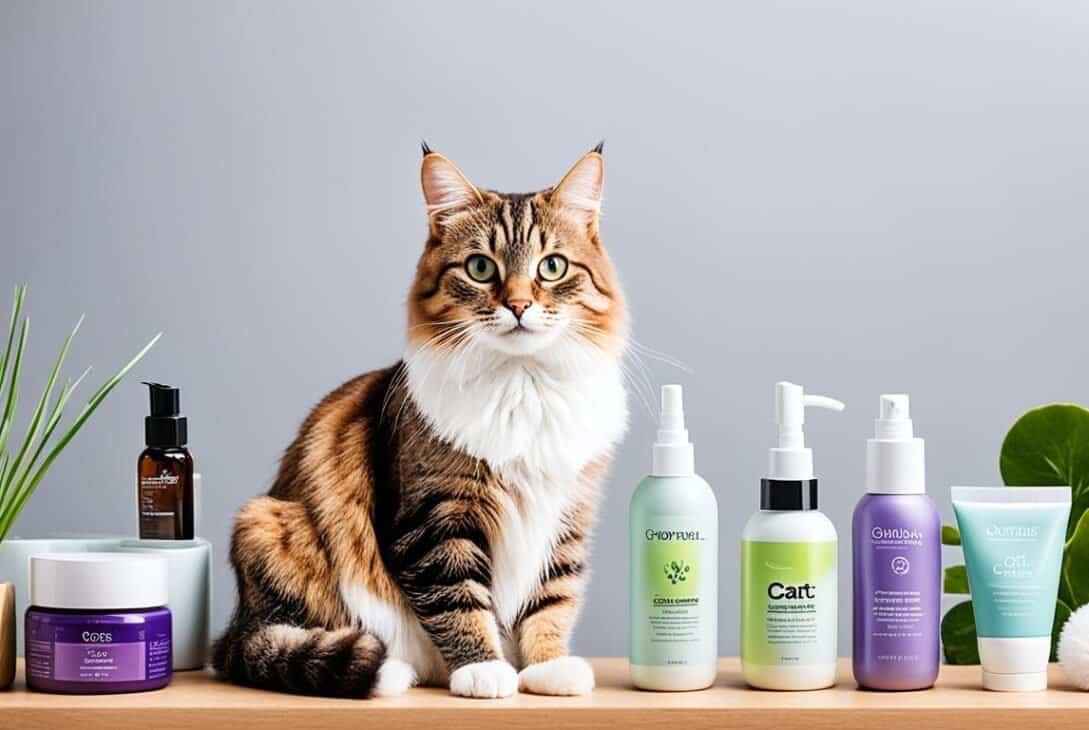


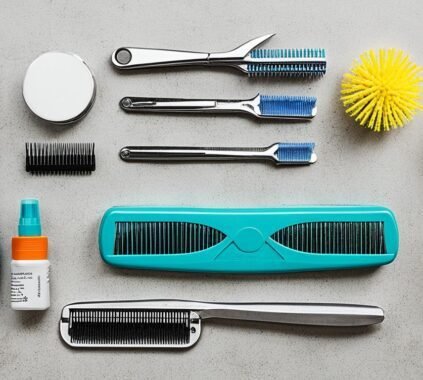
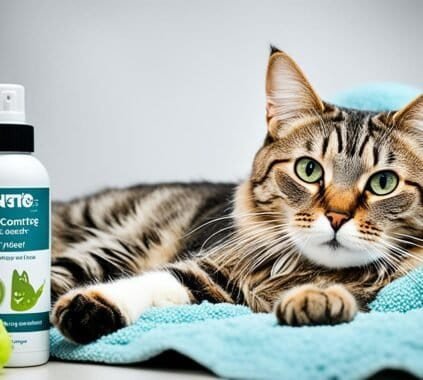


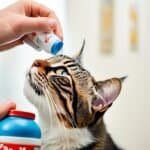





[…] tips for cat hairball prevention in cats. By implementing these strategies, you can help keep your cat’s digestive system healthy and minimize the formation of […]
[…] inflammation and irritation, leading to redness and discomfort. If you observe any changes in your cat’s skin tone or notice areas of heightened sensitivity, it’s important to investigate […]
[…] […]
[…] grooming needs in check. From deshedding brushes to shampoos and grooming wipes, having the right cat grooming supplies is important for maintaining a happy and healthy feline […]